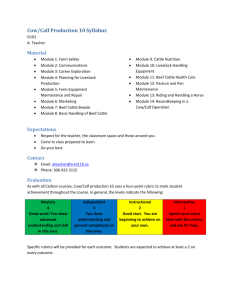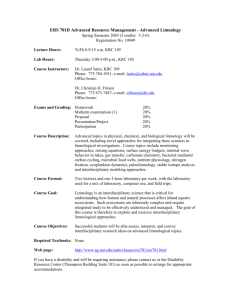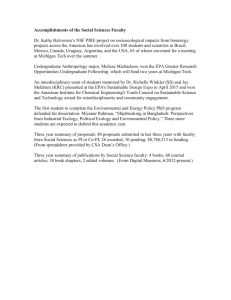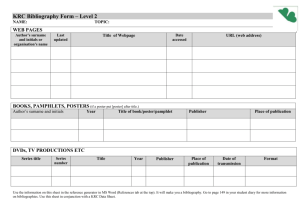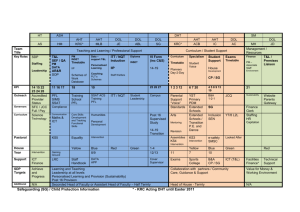AGSC 418 - Beef Cattle Management
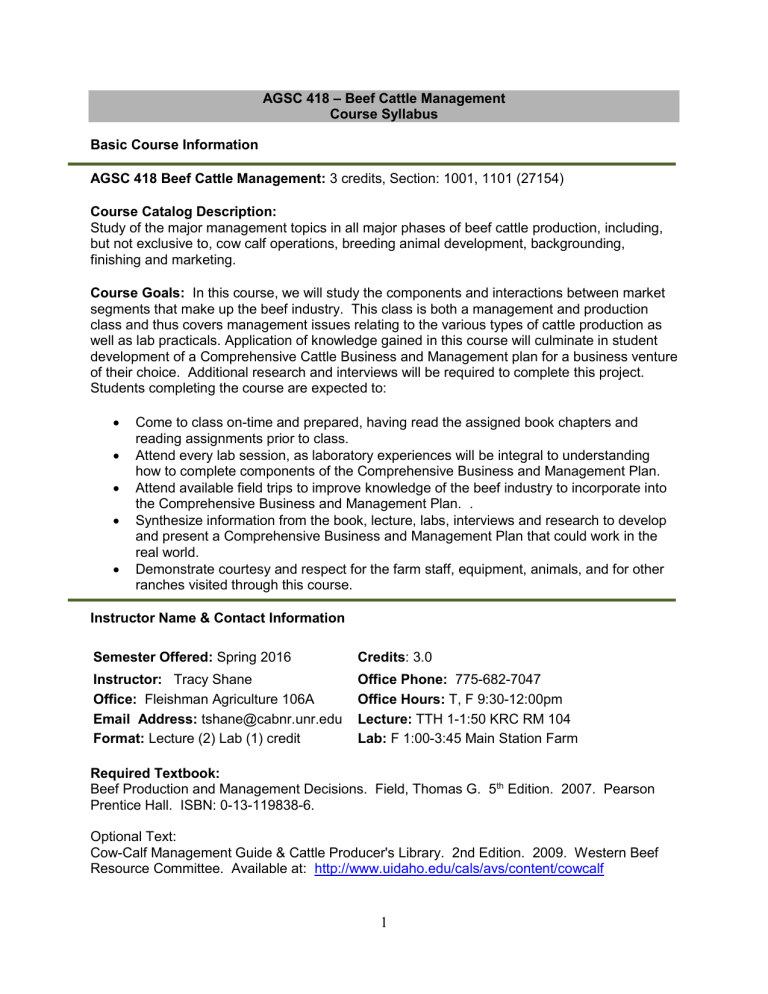
Basic Course Information
AGSC 418 – Beef Cattle Management
Course Syllabus
AGSC 418 Beef Cattle Management: 3 credits, Section: 1001, 1101 (27154)
Course Catalog Description:
Study of the major management topics in all major phases of beef cattle production, including, but not exclusive to, cow calf operations, breeding animal development, backgrounding, finishing and marketing.
Course Goals: In this course, we will study the components and interactions between market segments that make up the beef industry. This class is both a management and production class and thus covers management issues relating to the various types of cattle production as well as lab practicals. Application of knowledge gained in this course will culminate in student development of a Comprehensive Cattle Business and Management plan for a business venture of their choice. Additional research and interviews will be required to complete this project.
Students completing the course are expected to:
Come to class on-time and prepared, having read the assigned book chapters and reading assignments prior to class.
Attend every lab session, as laboratory experiences will be integral to understanding how to complete components of the Comprehensive Business and Management Plan.
Attend available field trips to improve knowledge of the beef industry to incorporate into the Comprehensive Business and Management Plan. .
Synthesize information from the book, lecture, labs, interviews and research to develop and present a Comprehensive Business and Management Plan that could work in the real world.
Demonstrate courtesy and respect for the farm staff, equipment, animals, and for other ranches visited through this course.
Instructor Name & Contact Information
Semester Offered: Spring 2016 Credits : 3.0
Instructor: Tracy Shane
Office: Fleishman Agriculture 106A
Office Phone: 775-682-7047
Office Hours: T, F 9:30-12:00pm
Email Address: tshane@cabnr.unr.edu
Lecture: TTH 1-1:50 KRC RM 104
Format: Lecture (2) Lab (1) credit Lab: F 1:00-3:45 Main Station Farm
Required Textbook:
Beef Production and Management Decisions. Field, Thomas G. 5 th Edition. 2007. Pearson
Prentice Hall. ISBN: 0-13-119838-6.
Optional Text:
Cow-Calf Management Guide & Cattle Producer's Library. 2nd Edition. 2009. Western Beef
Resource Committee. Available at: http://www.uidaho.edu/cals/avs/content/cowcalf
1
Silver Core Curriculum
This course satisfies Core Objective 14 (Application).
Brief Description of CO14: Students will be able to demonstrate their knowledge and skills developed in previous Core and major classes by completing a project or structured experience of practical significance.
Student Learning Outcomes and Measurements
Expected Learner Outcomes:
Learner Outcome
Measurements:
Describe the components of the beef cattle industry and Exams discuss interactions between various market segments.
Demonstrate application of managerial skills and production techniques through hands-on exercises during laboratory practicals.
Through problem solving exercises, gain an appreciation of the complexity of ranches, natural systems, and regulations which can complicate human efforts to manage the grazing environment.
Apply knowledge from agricultural science, nutrition, and rangeland management to develop a comprehensive business and management plan for a beef cattle business venture (CO14).
Communicate management decisions and business plan orally to the class and other audience members
(CO14).
Lab practical assignments, calving duties
Homework assignments, exams, business plan
Business plan
Business plan presentation
Course Requirements
Required Course Assignments (please see schedule at the end of the syllabus for your assignment schedule):
GRADED MATERIAL
Exam 1
Exam 2
Exam 3
Lab practicals
Comprehensive Business and Management
Plan
Plan Presentations
Participation in Plan Group
Total
POINTS
50
50
50
100
100
25
25
400
2
To determine the final course grade, your individual grades will be calculated on a percentage scale and then recorded as the corresponding grade point value and letter grade as shown below. Passing grades for this course range from “A” through “D”. Grade values are as follows:
A = 90-100% B = 80-89% C = 70-79% D = 60-69% F = 59% or less
Exams: These 50-pt exams will be non-cumulative and are designed to test understanding of the book, lecture materials, lab practicals and additional readings. Questions will be a mixture of multiple choice, true/false, short answer and essay questions. Exams must be taken at the assigned time. If an emergency should occur, the instructor must be notified before the exam time or the student receives a zero.
Lab Practicals: Each lab at the farm will have specific goals and objectives, often tied to learning the components of the Comprehensive Business and Management Plan. Lab practical assignments or checks on student skills will be done to ensure learning objectives are being met.
Calving Duties and Field Trips: Students will sign up for selected nights of calf watch for the heifers that are calving (roughly the first two weeks of April). Students will sign up for six checks of the heifers. During these checks students will be responsible for taking care of calving duties for the University's cow herd. The responsibilities will be discussed in more detail later in the semester and are part of the lab component of the grade. There will be field trip opportunities outside of scheduled class time. These trips, while not required, are important opportunities for students to meet cattle producers, learn about management topics from top industry spokesman, make connections between course material and real management issues, and prepare for careers in agriculture. As such, students that attend these opportunities will receive extra credit.
Comprehensive Business and Management Plan: Students will be assigned into a group of
3-4 students to develop a Comprehensive Business and Management Plan for a beef cattle business venture (seedstock, cow/calf, stocker, or feedlot) of the group’s choosing. Each group is responsible for one final plan and a presentation of that plan. Each individual in the group will be assigned one of the main components of the plan and will be evaluated on the component they are assigned. Component assignments include, herd health management plan, forage and feed needs assessment and sourcing plan, business plan and marketing plan.
Project Deliverables:
Each group will turn in a one-page description of the business venture on Feb 20 . The one-page description should include the business name, a general description of the business and a quantitative evaluation matrix for assessing individual participation in the group. Each student in the group will turn in one paragraph of the component they will be addressing and the resources they plan to utilize to complete that component (10 pts)
Interview summaries for each student – Due March 10
Draft Business and Management Plan Components (40 pts)- Part 1 Due March 31 . o Herd health management plan o Feeds need assessment and sourcing plan o Business plan o Marketing plan
Final Comprehensive Business Plan - Part 2 Due April 24.
3
o All sections of Part 1 revised o Executive Summary o Draft presentation
Comprehensive Business Plan Presentation to professor, ranchers, and agriculture lenders - Due May 6.
o 30 minute group presentation with 10 minutes for questions
Evaluations of Individual Participation - Due May 6.
o Turn in evaluations for each group member
Project Grading:
Each student will receive individual grades for their contribution to the group’s
Comprehensive Business and Management Plan worth 150 points. Each group will be evaluated on the following criteria and the group grade will be used to determine the amount of extra credit, up to 10 points that each group member can earn for working well together.
Group Comprehensive Business and Management Plan Grades o One-page description of the business venture (10 pts) o Group evaluation matrix completed (10 pts) o Executive summary (10 pts) o Comprehensive Business Plan Presentation (20 pts)
Individual Student Comprehensive Business and Management Plan Grade o One-paragraph description of plan component and resources (10 pts) o Interview summary (15 pts) o Draft plan component (40 pts) o Final (revised) plan component (25 pts) o Draft presentation for individual section (10 pts) o Individual contribution to Comprehensive Business Plan Presentation (25 pts) o Evaluation of participation (25 pts)
Student Requirements
Internet & WebCampus:
This course uses WebCampus for the facilitation of communications between faculty and students, submission of assignments, and posting of grades. The WebCampus Course Site can be accessed at https://wcl.unr.edu/ .
Attendance/Participation:
Class Starts at 1:00 pm. Please be on time . Preparation for class means reading the assigned readings & reviewing all information required for that week. Since participation during lectures is subjective, Attendance is MANDATORY. Pop quizzes will be given in events of low student attendance.
Late Assignment policy:
Assignments are due the day listed in the syllabus or assignment. No late presentations of business and management plan will be accepted. Any assignments turned in late will lose 10% of all points for each day late, until they hit 50% of total points (5 days). Assignments turned in
4
more than five days late will be accepted only if discussed with the instructor. It is better for the student to complete the assignments before exams and the business and management plan as to not affect performance on those assignments.
Cell Phones/Other Devices:
Cell phones must be turned off during class. If you have a family or work situation that requires you to wear a beeper or carry a cell phone, please discuss this with the instructor after the first class. Students whom are found texting on technological devices or surfing the web during lecture will be asked to leave the lecture.
Statement on Audio and Video Recording:
“Surreptitious or covert video-taping of class or unauthorized audio recording of class is prohibited by law and by Board of Regents policy. This class may be videotaped or audio recorded only with the written permission of the instructor. In order to accommodate students with disabilities, some students may be given permission to record class lectures and discussions. Therefore, students should understand that their comments during class may be recorded.”
Academic Integrity :
Cheating, plagiarism, or otherwise obtaining grades under false pretenses is a federal offense.
Students are expected to adhere to the ethical code as described in the UNR Student
Handbook. This code specifies that with enrollment an individual commits to the principles embodied in the code. Academic dishonesty in any form is not acceptable. In the event of an academic dishonesty issue, the procedures for addressing the issue are outlined in the
University’s “Academic Dishonesty Procedures”. If caught, you may be asked to leave the
University and will not be able to return. Use of a cell phone, PDA, or other instant messaging communication device to share answers during an examination will be considered cheating and all participants will be subject to appropriate discipline. It is not worth it, so study for those quizzes and exams. (See http://catalog.unr.edu/content.php?catoid=8&navoid=1989 for current catalog code and policies)
Accessibility Statement:
The instructor needs to be made aware of any physical or learning disabilities a student may have at the beginning of the semester in case some type of accommodations are needed for the class. American Disabilities Act: “Qualified students with physical or documented learning disabilities have the right to free accommodations to ensure equal access to educational opportunities at the University of Nevada, Reno.” For assistance, contact the Disability
Resource Center: 784-6000.
Schedule changes to topics or meeting locations:
As not all speakers and labs have been confirmed for the entire semester, announcements will be made during lecture or lab or through WebCampus regarding changes to presentation topics or meeting locations.
5
Date
6
10
12
13
17
19
20
24
Jan 20
22
23
27
29
30
Feb 3
5
26
27
Mar 3
5
31
Apr 2
3
7
9
10
14
16
6
7
10
12
13
24
26
27
17
21
23
24
28
30
May 1
May 2
5
12
AGSC 418 - Spring 2015
Tentative Class Schedule - Lecture and laboratory topics*
Wk Location Topic
2
2
3
3
1
1
1
2
KRC 104
KRC 104
Farm
KRC 104
KRC 104
Farm
KRC 104
KRC 104
Welcome, course overview, syllabus
Overview of the Beef Industry
Basic beef anatomy, sharps training, zoonosis
Beef anatomy and evaluation
Cattle behavior, facilities and equipment
Cattle behavior and evaluation
Business management plans and systems
Business management plans and systems
3
4
4
4
Farm
KRC 104
KRC 104
KRC Lab
BQA lab
Budgeting – Enterprise
Budgeting – Cash Flow
Business Plan Budgeting lab – cash flow
Seedstock management decisions 5
5
5
6
KRC 104
KRC 104
KRC Lab
KRC 104
Beef cattle selection and genetics
Exam 1 , Beef cattle selection, sire selection
6
6
7
7
7
7
8
8
8
9
9
9
10
10
10
11
11
11
12
12
KRC 104
Farm
KRC 104
Meats lab
KRC 104
Meats lab
Cow/Calf management decisions
Cow/Calf management decisions
Market cattle – live evaluation, ultrasound
Yerington Bulls for the 21 st
KRC 104
KRC 104
Farm
KRC 104
KRC 104
Farm
KRC 104
KRC 104
Farm
KRC 104
KRC 104
Farm
KRC 104
KRC 104
Yearling-Stocker management decisions
Slaughter process
Exam 2
– extra credit
Yearling-Stocker management decisions
Carcass evaluation - Wholesale and retail cuts
Century – Beef Mgmt Program
Yearling & cow-calf marketing plans/decisions
Bull breeding soundness exams, semen eval
Feedlot management decisions
Feedlot management decisions
Pregnancy Testing/Revise Business&Mgmt Plans
Retail cattle market
Reproduction and calving
Calving procedures/ reproduction lab
Herd Health Management
Building an Immune response
Vaccinations, herd health management plan
Nutrition, feeds
Developing a ration
12 RLEC/KRC Feeding plan, sourcing feeds
13 KRC 104 Forage production/ land assessment
13
13
14
14
KRC 104
Farm
KRC 104
KRC 104
Grazing management & stocking rates
Grazing management & stocking rates
Grazing management & stocking rates
Exam 3
14
14
15
16
Farm
Farm
KRC 104
KRC 104
Final Business & Mgmt Plan Presentations
Branding, castration, calf health
Master of beef advocacy
Final meeting, receive feedback on presentations
10:15am-12:15pm
6
Reading
Syllabus
Ch. 1
Ch. 17
Ch. 17
Ch. 18
Ch, 18
Ch. 3
Ch. 3
Handouts
Handout
Handout
Handouts
Ch. 4
Ch. 4 & 12
Ch. 4 & 12
Ch., 5
Ch. 5
Ch. 9, 17
Ch. 6
Ch. 6
Ch. 2, 9
Ch. 5
Ch. 6
Ch. 11
Ch. 7
Ch. 7
Ch. 2
Ch. 11
Ch. 11
Ch. 16
Ch. 16
Ch. 16
Ch. 16
Ch. 16
Ch. 4, 17
Ch. 2
Ch. 15
Early AM
Additional beef industry related events to attend
Feb 13
(Sifting)
-14
Fallon All-Breeds Bull Sale http://www.nevadacattlemen.org/fallonbullsale.aspx
(Sale)
Feb 16 Ward Ranch Bull Sale http://www.duartesales.com/WardRanchCat.pdf
Fallon
Livestock
Exchange
Gardnerville
, Nevada
1155
Foothill Rd.
Chico State Feb 27-
28
March
7-8
Western Regional Grazing Conference http://jeffersonhub.com/western-regional-grazingconference-grazing-for-change/
Bulls for the 21st century Beef Program and Sale http://slcnv.com/bfttfc.html
April 18-
19
Western National Angus Futurity http://www.angus.org/njaa/entrybook/2015/NJAApg10_11.pd
f
Snyder
Livestock,
Yerington
Reno
Livestock
Events
Center
7
